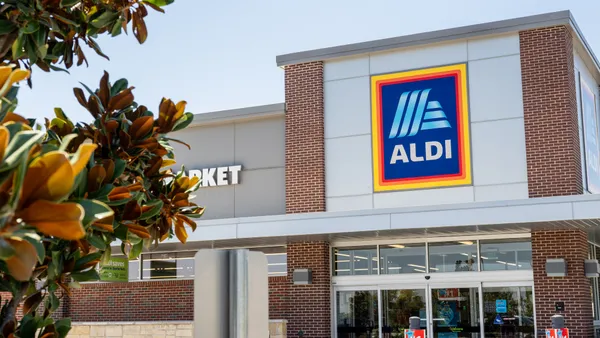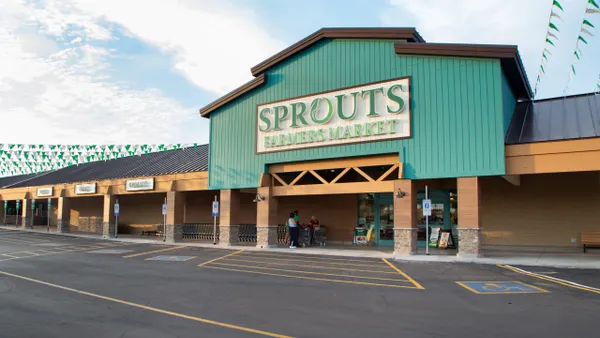Dive Brief:
- The National Grocers Association (NGA) outlined claims in a white paper released Tuesday that independent grocers are facing economic discrimination from anti-competitive practices of big box stores and large e-commerce retailers.
- Independent grocers have been forced to pay higher prices for fewer items, because major food retailers are getting different discounts, items and package sizes, according to the NGA. “Not only have independents lost access to popular products, but they have also lost promotional pricing opportunities that allow them to compete on price or discounts in sales,” Greg Ferrara, president and CEO of NGA, said during a press conference.
- The NGA, the Association of Wholesale Grocers (AWG) and independent grocers are asking Congress to update and enforce antitrust laws.
Dive Insight:
Independent grocers have struggled for years to compete with the buying and pricing heft of major retailers like Walmart. The pandemic has widened the gulf between the two sides, the NGA said, as grocery "power buyers" have leveraged industry disruption and unprecedented consumer demand to gain unfair advantages for their businesses.
"Grocery power buyers have taken advantage of the COVID-19 pandemic to further entrench their economic power at the expense of smaller competitors and producers," the NGA wrote in its white paper.
Courts and regulators haven’t enforced antitrust laws in a generation because the burden of proof is too high for private litigators and enforcement agencies have placed an “overemphasis” on business efficiency, said Christopher Jones, NGA’s senior vice president of government relations and counsel, during a press conference Tuesday.
The NGA and AWG criticized power buyers for leading to shortages of popular items for independent grocers, which often happens when suppliers focus on meeting the rising requirements of large retailers. Walmart, the NGA noted, has tightened its requirements for on time, in full deliveries and charges extra fees to suppliers that fail to meet its rules.
“Under the threat of losing business from those power buyers, which in some cases have 35 to 40% or more of the manufacturer’s total sales in a business that’s razor-thin margins, those suppliers by the large retailers are being forced to their demands or face crashing stock prices or worse yet,” AWG President and CEO David Smith said.
Additionally, purchasing scale is no longer transparent, Smith said: “Companies like ours don’t have targets to shoot at … to remain competitive.”
The white paper explains how anti-competitive tactics can lead to economic discrimination, which affects the products, prices and package sizes available, and supply chain concentration, ultimately hurting independent grocers, farmers and consumers.
Jimmy Wright, president and owner of Wright’s Market in Opelika, Alabama, described during the press conference having trouble keeping items in stock during the pandemic while his competitors did not, causing customers to head to the larger retailers for those items.
“Even when products were limited across the supply chain, my competition received some of the high-demand items such as paper and cleaners, while we received none … This also resulted in a loss of business for Wright’s Market,” Wright said.
Wright said that for years his store has gotten discounted prices less often than its large competitors and is not offered the same package sizes. “For us to compete, we must buy large quantities of these key items while the discount pricing is available,” Wright said.
Some independent grocers have resorted to buying entire pallets of products from their competitors because their retail prices are lower than the wholesale prices quoted to the independents, according to the white paper.
The NGA is calling on Congress to hold investigations and hearings into anti-competitive practices in the grocery industry with a focus on discriminatory impacts on rural and urban consumers, producers and businesses. The group also wants to see Congress serve as a watchdog of antitrust enforcers.
The NGA has been talking with Sen. Amy Klobuchar (D-MN) and Rep. David Cicilline (D-RI), who chair the antitrust subcommittees, along with several Democrats and Republicans, Jones said, noting that Klobuchar has already proposed legislation tackling economic discrimination. The NGA has also talked to Federal Trade Commission (FTC) regulators and is awaiting agency nominees to be appointed and installed, Jones added.
In addition to Congressional action, the NGA said the FTC, the Department of Justice and state attorneys general should examine agreements between grocery “power buyers” and suppliers for discriminatory actions.
“We think this feeds into a lot of the concerns in the Big Tech space,” Jones said, noting that Amazon, which is facing Congressional scrutiny, is ramping up its grocery presence. Without changes, the NGA said that independent stores will continue to consolidate.









